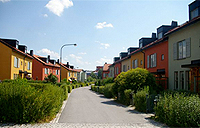More than half the world’s population lives in cities and much of what counts as urbanization is actually suburbanization. The term encompases everything from the wealthy gated communities of Southern California to the high rise-dominated suburbs of Europe and Canada, the exploding outskirts of Indian and Chinese cities, and the slums and squatter settlements in Africa and Latin America.
From Thursday, Sept. 26 to Saturday, Sept. 28, the Global Suburbanisms: Governance, Land and Infrastructure in the 21st Century conference will feature dozens of panels on issues such as reducing auto- dependency, social justice and immigrant settlement in local suburbs. Registration will start at 11:30am at the CIBC Lobby of the Accolade East Building, Keele campus.
dependency, social justice and immigrant settlement in local suburbs. Registration will start at 11:30am at the CIBC Lobby of the Accolade East Building, Keele campus.
Suburbanization
This international conference, a Major Collaborative Research Initiative (MCRI) of the City Institute at York University (CITY), will bring together more than 100 scholars and urban practitioners from around the world to explore this universal – yet often overlooked – suburban experience. It’s about bringing the fringe to the centre of global urban research and practice.
Most urban growth worldwide in the 21st century takes the form of peripheral or suburban development. Whether by choice or by force, builders, residents and workers, rich and poor, construct, live and work in urban peripheries around the world.
According to a new report, despite the downtown condo boom, five times as many Canadians continue to opt for homes on our cities’ suburban edges. (Sub)Urbanization marks the moment of shared experience as planetary citizens even though built forms differ. Problems in Don Mills or Rexdale, Ont., have counterparts in Paris and Shanghai.
Suburban building forms in Brampton, Ont., or Surrey, B.C., both lead and follow developments in South Asia and China; global processes have local connections.
Panels will discuss the conference themes of “understanding suburbanization”, “governance”, “land”, “infrastructure” and “regions”.
Highlights will include:
 • The launch of Suburban Constellations, edited by York University professor Roger Keil (right) – the first major publication of the MCRI; a first account of global developments in a widely illustrated, comprehensive volume.
• The launch of Suburban Constellations, edited by York University professor Roger Keil (right) – the first major publication of the MCRI; a first account of global developments in a widely illustrated, comprehensive volume.
• The unveiling of the Greater Toronto Suburban Working Group’s “Roundtable Report”, a call to arms for citizen activists and political change developed by a multisectoral group of Greater Toronto Area agencies, scholars and practitioners, aimed at changing the conversation and taking the sub out of suburbanisms (Sept. 27, 12pm).
For a full conference program and list of speakers, click here.
MCRI’s Global Suburbanisms: Governance, Land and Infrastructure in the 21st Century conference is supported by the Social Sciences and Humanities Research Council of Canada (SSHRC). Presented through CITY in collaboration with the Canadian Urban Institute and sponsored by SSHRC and York University, it represents the mid-term meeting of this initiative.


